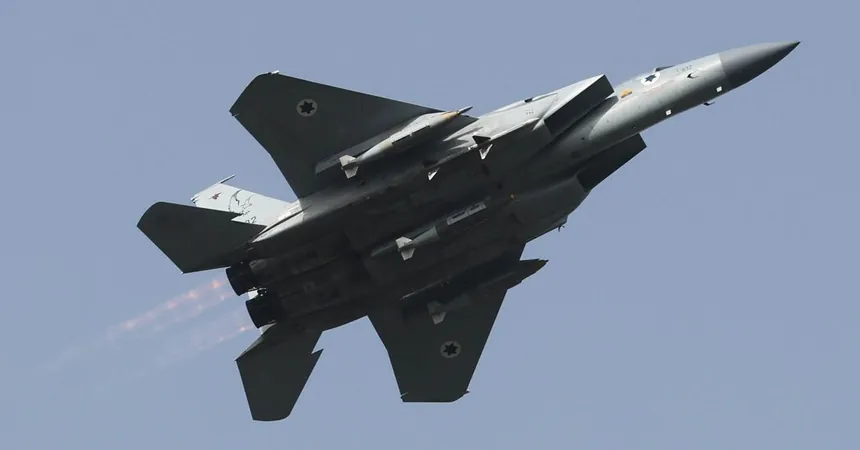
Is Israel Ready to Strike Iran's Nuclear Sites? A Closer Look at the Impending Tensions
2024-10-08
Author: Ling
Is Israel Ready to Strike Iran's Nuclear Sites?
In a dramatic display of military prowess, Israeli fighter jets recently swept across the Mediterranean, simulating a high-stakes operation targeting Iran's heavily fortified nuclear facilities. This large-scale exercise, publicly lauded by the Israeli defense forces as a critical training necessity for 'long-range flight, aerial refueling, and striking distant targets,' sends a clear message to both Iran and the Biden administration.
The underlying goal of these maneuvers transcends mere intimidation; they serve to announce Israel’s resolve to conduct potential operations independently. However, experts suggest that without the backing of U.S. military resources—most notably the formidable 30,000-pound 'bunker buster' bombs—Israel's chances of delivering a significant blow to Iran's nuclear ambitions are greatly diminished.
Escalating Regional Tensions
In light of escalating regional tensions, American military officials have expressed mounting concern that Israel might embark on unilateral action. After a recent Iranian missile attack that targeted Israel, President Biden cautioned Israeli leaders, emphasizing that any response must be 'proportional.' Defense Secretary Lloyd Austin reinforced this message during discussions with his Israeli counterpart, Yoav Gallant, advocating for restraint to avoid igniting a broader conflict.
Israel is expected to focus its initial retaliatory efforts on military and intelligence installations rather than the heart of Iran's nuclear program. High-ranking officials in Israel have indicated that, for now, the priority will be on less sensitive targets, with the nuclear sites being reserved for a potential future escalation should Iran respond aggressively.
Internal Pressure for Action
The current dialogue in Israel reflects a growing impatience among some factions, urging immediate action to undermine Iran's nuclear capabilities. Former Prime Minister Naftali Bennett articulated this urgency on social media, declaring that Israel stands at a critical juncture to reshape the geopolitical landscape of the Middle East. He made a compelling case for aggressive intervention, highlighting the notion that Iran’s traditional allies, Hezbollah and Hamas, are currently in a weakened state.
Despite this internal pressure, U.S. officials are desperately trying to dissuade Israel from any military escalation, warning that strikes against nuclear facilities could backfire, potentially driving Iran further underground in its nuclear pursuits while also sparking a large-scale confrontation in the region.
The Potential Impact of an Israeli Strike
The ongoing discourse raises fundamental questions about the efficacy and potential consequences of an Israeli strike on Iran. How significantly could such an attack hinder Iran's nuclear development? Or might it merely provoke Tehran into fortifying its existing infrastructure and expelling international nuclear inspectors, thus stalling transparency?
While recent intelligence indicates that Iran is ramping up its uranium enrichment to nearly bomb-grade levels, capabilities at sites like Natanz tempt Israel into action. However, past U.S. administrations have consistently discouraged military engagement, instead advocating for a combination of diplomatic outreach, sanctions, and covert actions, like cyber operations to disrupt Iran's progress.
Cyber Warfare and Resilience
Historically, attempts such as the 'Olympic Games' operation showcased the potential of cyber warfare against Iran, inflicting considerable damage to centrifuges via the Stuxnet virus. Yet, Iran has demonstrated resilience, quickly rebuilding and expanding its nuclear capabilities. As the geopolitical landscape evolves, Israeli officials express a persistent need for preparedness against an unpredictable foe.
Operational Challenges
Nevertheless, Israel's operational challenges remain significant. With aging military assets and reliance on aerial refueling planes that may not adequately support long-range strikes, the potential for an effective operation is hindered.
Now more than ever, the world watches closely as tensions reach a boiling point. The fates of two nations hang in the balance, and both military strategy and diplomatic maneuvering will play a critical role in shaping the future landscape of the Middle East. Will Israel act decisively, or will cooler heads prevail before irreversible actions are taken? Stay tuned, as the situation continues to unfold!


 Brasil (PT)
Brasil (PT)
 Canada (EN)
Canada (EN)
 Chile (ES)
Chile (ES)
 España (ES)
España (ES)
 France (FR)
France (FR)
 Hong Kong (EN)
Hong Kong (EN)
 Italia (IT)
Italia (IT)
 日本 (JA)
日本 (JA)
 Magyarország (HU)
Magyarország (HU)
 Norge (NO)
Norge (NO)
 Polska (PL)
Polska (PL)
 Schweiz (DE)
Schweiz (DE)
 Singapore (EN)
Singapore (EN)
 Sverige (SV)
Sverige (SV)
 Suomi (FI)
Suomi (FI)
 Türkiye (TR)
Türkiye (TR)